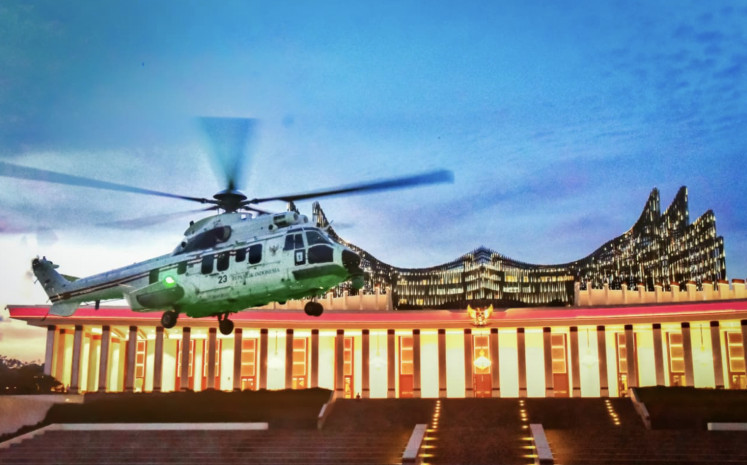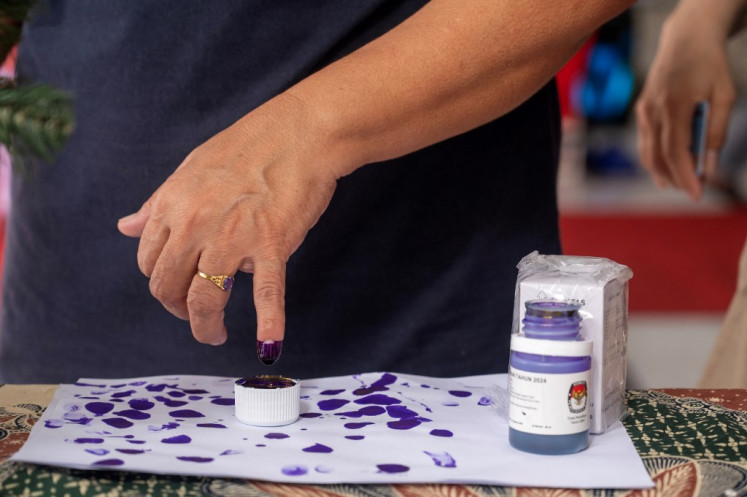Popular Reads
Top Results
Can't find what you're looking for?
View all search resultsPopular Reads
Top Results
Can't find what you're looking for?
View all search resultsAhmadiyah children denied right to free education
Sixth grader Muhyidin Sayid Ahmad returned home from school wearing a sad face
Change text size
Gift Premium Articles
to Anyone
S
ixth grader Muhyidin Sayid Ahmad returned home from school wearing a sad face. His school had just denied him the right to free education that has been provided by the West Nusa Tenggara provincial administration for poor students for the past two years.
Muhyidin is one of 40 children of Islamic sect Ahmadiyah who have been living in Wisma Transito in Mataram, West Nusa Tenggara, for the past four years, since they were driven out of their homes by an angry mob in Ketapang hamlet, Lingsar district, in West Lombok regency.
Apsotates?: Children of Jamaah Ahmadiyah members pose at a refugee shelter in Mataram, West Nusa Tenggara. The children, who have been persecuted by local Muslims and the authorities, have also been denied their right to a free education. JP/Panca Nugraha
Of the 40 children, 20 are in primary school, seven in high school and the rest are of preschool age.
The boy’s father, Syahidin, said his son’s poor friends were getting cash assistance from the program — called the Assistance for Poor Students [BSM] — from his school, the nearby SDN 42 elementary school.
“But my son did not get the assistance despite the fact we’re so poor,” Syahidin told The Jakarta Post.
Children of other Ahmadiyah refugees suffered the same gloomy fate.
“There are 40 children here. None of them received assistance for poor students,” said 45-year-old Syahidin, who is the refugee coordinator at the shelter.
Under the program, which disburses cash every three months, each needy elementary school student is entitled to receive Rp 15,000 [US$1.68] a month. Junior high school students get Rp 50,000 and high school students get Rp 75,000.
The provincial administration has provided more than Rp 124 billion annually through the BSM program since 2009.
However, the children of Ahmadiyah members have not been included in the program.
Syahidin said that as refugees, the sect’s members had been living with a social unclear status over the
past year.
On the other hand, they have to survive, including to provide their children’s school needs, such as for transportation, books and uniform.
Each year, he said, the condition of refugees worsened.
The province’s Social Affairs Office stopped providing assistance to them in mid 2008 on the grounds that the assistance was allocated for only two years.
The provision of rice and cash for dishes also stopped and the refugees now have to fend for themselves. Many of the refugees, mostly farmers, ended up doing odd jobs, such as working as construction workers.
Over the past six months, they have been living in the shelter without electricity because they can not afford to pay the bills.
“We have tried everything to be able to return home to Ketapang but to no avail. We can only resign ourselves to our fate and hope for justice from God,” Syahidin said.
None of the refugees hold valid identity cards — which are required to be eligible for government assistance for the poor.
“Our Ketapang identity cards have expired. It is impossible for us to apply for ID cards here since we have been rejected everywhere,” Syahidin said.
“Without this card, we can’t apply to get free healthcare or education programs.”
The province’s Education Youth and Sports Office secretary M. Imhal said the BSM assistance aimed to reach every poor student.
However, he said, the program’s recipients were listed by school authorities, not his office.
“We get the data from schools. If the refugees’ children did not get the aid, they were probably not listed by their schools.”
The province’s Ahmadiyah advisor, Nasiruddin, said the refugees had been aided by overseas relief groups, human rights observers and foreign embassies, not their own government.
“Why does the international community care about us, while our own government thinks we don’t exist?” Nasiruddin said.
“The government should not shut their eyes and ears,” he said. “If they don’t wish to take any notice of us, that’s fine. But please take notice of the condition of our children.”










